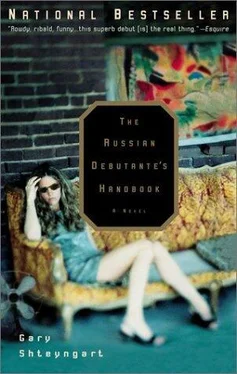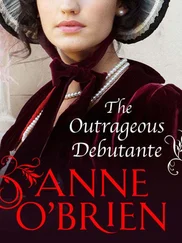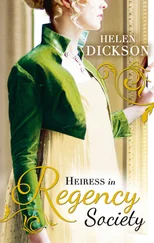Gary Shteyngart - The Russian Debutante's Handbook
Здесь есть возможность читать онлайн «Gary Shteyngart - The Russian Debutante's Handbook» весь текст электронной книги совершенно бесплатно (целиком полную версию без сокращений). В некоторых случаях можно слушать аудио, скачать через торрент в формате fb2 и присутствует краткое содержание. Город: New York, Год выпуска: 2003, ISBN: 2003, Издательство: Riverhead Books, Жанр: Современная проза, Юмористическая проза, на английском языке. Описание произведения, (предисловие) а так же отзывы посетителей доступны на портале библиотеки ЛибКат.
- Название:The Russian Debutante's Handbook
- Автор:
- Издательство:Riverhead Books
- Жанр:
- Год:2003
- Город:New York
- ISBN:0-7865-4177-6
- Рейтинг книги:4 / 5. Голосов: 1
-
Избранное:Добавить в избранное
- Отзывы:
-
Ваша оценка:
- 80
- 1
- 2
- 3
- 4
- 5
The Russian Debutante's Handbook: краткое содержание, описание и аннотация
Предлагаем к чтению аннотацию, описание, краткое содержание или предисловие (зависит от того, что написал сам автор книги «The Russian Debutante's Handbook»). Если вы не нашли необходимую информацию о книге — напишите в комментариях, мы постараемся отыскать её.
and
. The Russian Debutante’s Handbook Bursting with wit, humor, and rare insight,
is both a highly imaginative romp and a serious exploration of what it means to be an immigrant in America.
The Russian Debutante's Handbook — читать онлайн бесплатно полную книгу (весь текст) целиком
Ниже представлен текст книги, разбитый по страницам. Система сохранения места последней прочитанной страницы, позволяет с удобством читать онлайн бесплатно книгу «The Russian Debutante's Handbook», без необходимости каждый раз заново искать на чём Вы остановились. Поставьте закладку, и сможете в любой момент перейти на страницу, на которой закончили чтение.
Интервал:
Закладка:
“Your case remains highly contentious,” Vladimir cheerfully lied. Yes, the key was to remain cheerful. Big smile. They were playing Ducking Reality, a delightful little game expressly designed for Russian émigrés. Why, Vladimir’s own grandmother was a national champion. “I have met with several members of the House Judiciary Committee…”
“So, I take it, you visited the president at his White House.”
“It was closed,” Vladimir said. And why was it closed? Easy enough. “The air-conditioning broke.”
“And they couldn’t turn on a few fans ?” Rybakov shook his head and his fist in protest to the White House staff. “All these Americans are pigs. Air-conditioning. Hypermalls. Trash, these people. I ought to write another letter to the Times on the theme of ‘Where Is This Country Going?’ Except as a citizen I would have more clout.”
“Any day now,” Vladimir reassured him. It was good to keep these things open-ended.
“And did you see the president’s developing young daughter? That delightful creature!”
“I caught a glimpse of her at the Kennedy Center. She’s coming along nicely.” Now, this wasn’t even lying anymore. This was storytelling for invalids. This was social work. This was outreach to the elderly.
Rybakov rubbed his hands together and winked at Vladimir. Then he sighed and fingered the insignia on his cap. He wiped the water spray off his sunglasses. Leaning against the bow of his speedboat in his sunglasses and cap, this was as close as Mr. Rybakov had ever come to looking like a New World person—rich, American, in control. Vladimir was reminded of his own adolescent daydreams: young Vladimir, the simple-minded son of a local factory owner, running triumphantly down the field of his Hebrew school’s opulent Recreation Centrum, the eyes of the local Benetton-clad maidens following intently the brown oblong ball encased in his burly arms as he scored the “home goal” or “home run” or whatever it was he had to score. All in all, Vladimir’s American dreams formed a curious arc. During adolescence he dreamed of acceptance. In his brief days at college he dreamed of love. After college, he dreamed of a rather improbable dialectic of both love and acceptance. And now, with love and acceptance finally in the bag, he dreamed of money. What fresh tortures would await him next?
“Maybe next time you’re in Washington,” Mr. Rybakov was saying, “you could introduce me to the first daughter. We could go out for ice cream. A young lady like her could be very interested in my tales of the sea.”
Vladimir nodded his assent as the half-moon of southern Manhattan rapidly receded behind them. The skyscrapers, chief among them the World Trade Center towers, appeared as if they were rising directly out of the water (an almost Venetian effect), or as if they were perched on an offering platter.
“There she is!” Rybakov shouted to Vladko. They were fast approaching a cargo ship anchored midharbor, her hull rusted pink, her prow stenciled with the Cyrillic legend: Sovetskaya Vlast’, or Soviet Might. The vessel flew under the somber red-and-black flag of Armenia, which, as Vladimir remembered from his abbreviated Leningrad schooling, was a land-locked country. “Aha,” Vladimir said, his tone full of simulated good nature. “An Armenian flag on a ship. Now here’s a curious sight.”
Once the Brezhnev drew alongside the stern of the Vlast’, a rope was thrown overboard by an unseen Armenian sailor and speedily tethered to the Brezhnev by the indispensable Vladko. A metallic boat—no, a very uncomplicated raft, like the cover of a shoebox—was soon lowered as well. “I see the Armenians are expecting us,” Vladimir said. He suddenly thought of Francesca, of her proximity… Why, at this very moment, across the bay and only two kilometers uptown, she was returning from school to the Ruoccos’ bright little aerie, dropping her satchel by the bread-maker, washing the heat off her face in the cat’s bathroom with its oddly comforting smells. Yes, she was making Vladimir into a human being, an indigenous citizen of this world.
“What Armenians?” Rybakov said. “These are Georgians.”
“Georgians,” Vladimir said. It was better not to ask questions. But a note of fear sounded in the back of his head, that cramped space where his money dreams were also headquartered. Fear and money. They went well together.
Once the Georgians’ lifeboat was aligned with the Brezhnev, Vladko rushed over to help Rybakov aboard, but the sporty septuagenarian used his crutches to catapult himself inside. “Look at me!” he cheered. “I can still whack the both of you youngsters!”
“Which gun do I bring?” Vladko mumbled, saddened by his own irrelevance.
Gun? Vladimir’s Fear-Money gland coiled around his brain and squeezed gently. “We’ll be searched,” Rybakov said. “So you might as well bring something impossible to conceal, then turn it in immediately to show compliance. The Kalashnikov, say.”
Vladko disappeared below deck.
“Ensign!” the Fan Man said to Vladimir. “Hurry up. The television program about the comical black midget starts promptly at eight o’clock Eastern Standard Time. I cannot miss it.”
“You go on,” Vladimir said, pretending to play with Fanya, the little fan, as if he couldn’t be bothered with Mr. Rybakov’s little errands. “I will await your return.”
“Oho, what is this?” Rybakov said. “Your presence is both requested and required. We’re doing all this for you, you know. You don’t want to disappoint the Georgians.”
“Yes, clearly not,” Vladimir said. “But you must see my concerns. I am from Russia originally, this is true, but I am also from Scarsdale… From Westchester…” This seemed to eloquently sum up his concerns.
“And?”
“And I’m worried about… Well, Georgians, Kalashnikovs, violence. Stalin was a Georgian, you know.”
“What a pizdyuk you are,” Rybakov huffed, alluding to the kind of man who is somehow vagina-like in nature. “The Georgians take time out of their busy schedule to pay tribute to you, they’ve sailed around the world with duty-free gifts, and you cower like a milksop. Get in here!
“And I won’t have you badmouthing Stalin either,” he added.
THE TWO SEAMENwere the largest Georgians Vladimir had ever seen, each about two hundred pounds (the Vlast’ must have carried some incredible rations), and each with the gloomy oblong face and fertile black moustache common to the men of Caucasus.
“Vladimir Girshkin, these are Daushvili and Pushka, both associates of my son, the Groundhog.”
“Hurrah!” the two men said. But quietly.
The swarthier of the two, the one named Pushka, which, Vladimir assumed, was a nickname, for it meant “cannon” in Russian, said in a collegial tone: “And now we will go inside for the zakuski. You will have to give us your weapon, blondie.”
Vladko bowed and surrendered his immense Kalashnikov, the first weapon Vladimir had ever seen; the Georgians bowed back, and Vladko bowed yet again—a merger between two Japanese banks was now seemingly complete. They walked along the starboard of the Vlast’, Vladimir eyeing the Statue of Liberty across the harbor, wondering if any crime could be committed directly in her sight. The color she was painted, Soviet-cafeteria green, did not inspire confidence. Francesca, meanwhile, was likely hunting through the Arts section of the paper, rolling a cigarette over the coffee table, and planning a triumphant evening out for the two of them.
“Watch your little head, friend,” Daushvili said. They ducked into a humble room, unexposed pipework serving as roof, the walls decorated with pages of German automobile magazines and the occasional poster of Soviet pop diva Alla Pugacheva parading her strawberry bouffant at the EuroVision Song Contest, crooning her summertime hit “A Million Scarlet Roses.” The Georgians were seated around a long foldout table covered in zakuski. From afar, Vladimir could already spot the glossy blackness of cheap caviar flanked by plates of rusty herring. He was hoping for skewers of Georgian shashlik, preferably lamb, but there was no grill in sight.
Читать дальшеИнтервал:
Закладка:
Похожие книги на «The Russian Debutante's Handbook»
Представляем Вашему вниманию похожие книги на «The Russian Debutante's Handbook» списком для выбора. Мы отобрали схожую по названию и смыслу литературу в надежде предоставить читателям больше вариантов отыскать новые, интересные, ещё непрочитанные произведения.
Обсуждение, отзывы о книге «The Russian Debutante's Handbook» и просто собственные мнения читателей. Оставьте ваши комментарии, напишите, что Вы думаете о произведении, его смысле или главных героях. Укажите что конкретно понравилось, а что нет, и почему Вы так считаете.












